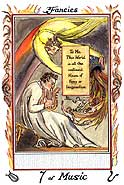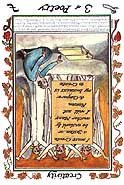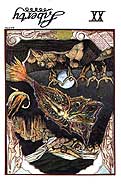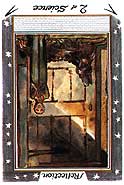| The Shadow Truth spread provides insight into your attitudes and hidden feelings. This spread is used when you are having trouble confronting something, or fear that you are concealing something from yourself. The William Blake Tarot explores the mystical vision and artistry of the renowned English painter and poet. Through rich interpretations focused on creative undertakings, it has long been the deck of choice for artists, writers, musicians, and thinkers. For more information about this deck, or to buy your own personal copy, go to www.blaketarot.com.
|
 | The card in the center represents the attitude you assume. Seven of Music (Fancies): "To Me This World is all One continued Vision of Fancy or Imagination". Inspired by a range of opportunities and ideas. Expressive challenges involving dreams and daydreams, or altered states of consciousness. Challenges of immediate versus long-term gratification. In the creative process: Let your visions and dreams lead the way into deeper realms of your imagination, and be prepared to express them. Rehearse and explore wild ideas in your mind before acting on them. |
 | The card to the right represents the thoughts and feelings that underly your attitudes. Three of Poetry (Creativity), when reversed: Seeking a creative opportunity in a commercial environment. Imaginative approaches are squandered in mundane circumstances. Seeking Truth where only Fact can be found. In the creative process: You get the go-ahead to "do your thing"; your project has special blessing at this time because of your ability to see an overview or get the big picture. |
 | The card at the top represents how your attitude is evolving and will evolve in the future. Liberty, when reversed: Restriction of personal freedom. A call to action goes unheard. Failure to reach a deeper level of awareness or sense of spiritual self. Failure to effect a basic change of state. Refusal to make an important decision or judgment, perhaps one long delayed. Being bound by limiting circumstances. |
 | The card to the left represents how others perceive your attitude. Two of Science (Reflection), when reversed: Hesitating before opportunity. Dilemma. Uncertain whether to stay put or go on. Waiting for something to happen. Denying your feelings. In the creative process: An uneasy decision about which way to proceed, perhaps between a rational versus intuitive approach. Weigh the potential rewards versus the possible dangers. |
 | The card at the bottom represents what you cannot confront or are hiding from yourself. Mystery: Relying on your intuitive abilities and listening to inner wisdom. Unexplained or mysterious energies at work. Issues of sexuality. Feeling a sense of divine protection. Guarding your territory. Look around you for instructive omens and portents. Attraction to or advice from a wise woman. |









